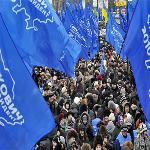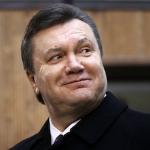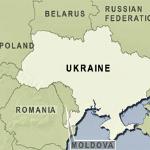10 February 2010

Photo: AP
Supporters of Ukrainian opposition leader and presidential candidate Viktor Yanukovych hold a massive rally in front of the Central Election Commission in Kyiv, 10 Feb 2010
Aides to Ukrainian presidential candidate Yulia Tymoshenko say she is planning a legal challenge to Sunday's election results, which showed a victory for former Prime Minister Viktor Yanukovych. The new president will assume power with less than 50 percent of the vote and amid deep public distrust toward governmental institutions.
More than half of Ukraine's voters opposed Victor Yanukovych, the projected winner in Sunday's election. And about four percent of ballots were cast for "none of the above."
This and the country's constitutional structure will force compromise, says Oleh Soskin, Director of the Society Transformation Institute in Kyiv.

AP
Ukrainian opposition leader and presidential candidate Viktor Yanukovych, 07 Feb 2010Soskin says the new president will need to reach agreements, adding that Ukraine's constitutional structure does not lend itself to dictatorship.
In a word of caution, Soskin says Ukraine's bloated and politicized force of 600,000 Interior Ministry troops and functionaries could help usher in dictator.
The analyst says the prime minister retains the greatest executive authority. And considerable power is shared with parliament. Outgoing President Victor Yushchenko failed, says Soskin, because he acted with little regard for other institutions of government.
Ordinary Ukrainians heap scorn on parliament, whose members have voted themselves immunity from prosecution for violating their own laws. Soskin says they are elected through an undemocratic process.
Soskin says Ukrainians should adopt a resolution proposed in 2007 by the Parliamentary Assembly of Europe. He notes the measure calls for open ballots so that party elites and political clans would be prevented from deciding who places where on the list and taking bribes for it, then Ukraine would have a fairly good working model of democracy.
Courts are considered among the most corrupt institutions in Ukraine.
Yuriy Yakymenko, at Kyiv's Razumkov Center research institute, says judges are not independent of the president.
Yakymenko says the disease of any authority begins at the top. If there is politicized appointment of judges, he says, and if the judicial system is not independent of other branches of government, then these are the primary factors that open the possibility of illegal influence on judges.
The Foreign Ministry is controlled by the president, but he often faces domestic pressure to pursue specific policies. Eastern Ukraine, for example, has pushed for closer economic and cultural ties with Russia. Mr. Yanukovych has promised to pursue such goals. Many in Western Ukraine oppose them, including Dmytro Korchynsky, leader of the UNSO nationalist organization.
Korchynsky says his organization expects Yanukovych to go back on his promises [of closer ties with Russia] but if he doesn't, this will lead to the mobilization of nationalist elements in society.
Some analysts say the president may be urged by oligarchs not to follow through on pro-Russian campaign promises. They point out that while Russia is investing in Ukraine, Ukrainian oligarchs are putting more of their money in Western Europe.

VOA
Analyst Yuriy Yakymenko says if Russian capital penetrates Ukraine it can gradually assume commanding positions and undermine the position of Ukrainian oligarchs. Therefore, he does not think they will support policies of maximum openness for Russia and thus reorientation of Ukrainian [foreign policy] from West to East.
Oleh Soskin alleges the Ukrainian treasury has been raided by many oligarchs and politicians who have gotten wealthy by embezzling funds that Ukraine gets from its gas trade with Russia. But new market agreements with Moscow could force the president to stop passing along the costs of corruption.
Soskin says the new president will need to immediately release the price of gas. As soon as he does that, it's clear consumers will not bear it, because they have been robbed. They do not have sources of money to cover such a high price -- $300 [per 1,000 cubic meters] -- and this will provide social impetus for change.
Ukrainian voters, says Oleh Soskin, are practiced at voting out politicians and parties they feel have betrayed them - first the Communists, then the Socialists and now President Yushchenko. He says if the new president wishes to avoid the people's wrath, even social unrest, he must side with them against a corrupt establishment to clean up the country's institutions.